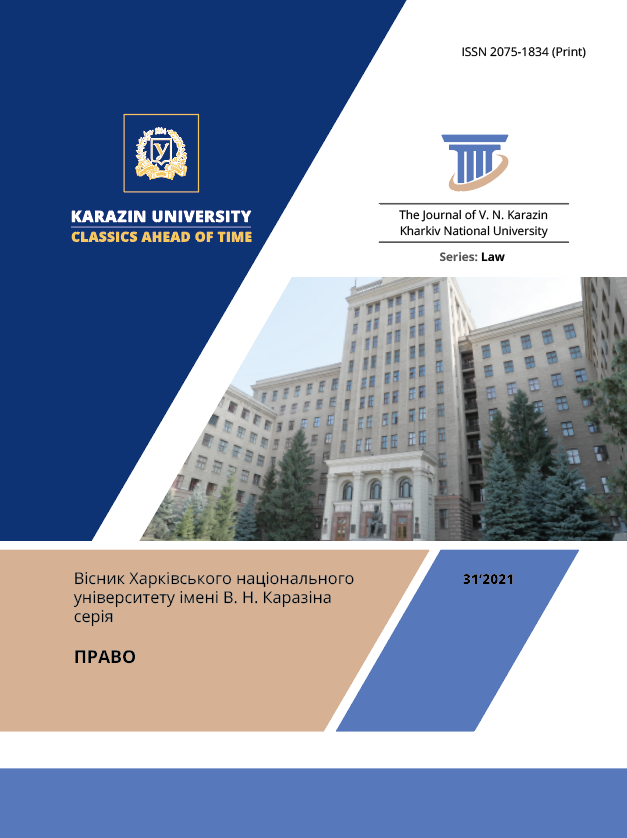UNIVERSALIZATION OF LAW AND UNIFICATION OF UKRAINIAN CRIMINAL LEGISLATION
Abstract
In the context of social processes globalization, the guidelines for the legal systems development, in particular, criminal law system, are transformed from the processes of unlimited differentiation and domestic "legal isolationism" to the trend of unification and universalization of law. The concept of reforming Ukraine criminal legislation should be focused on the new criminal legislation, which should be built on a single basis, using modern advances in legislation. This will make it possible to harmonize terminology. The appropriate approach determines the vector of the state criminal law policy, which is aimed at unification of criminal law, but doesn’t exclude the expediency of reasonable differentiation. The purpose of the article: to find out the meaning and impact of the law universalization and criminal law unification, to determine the processes of its implementation in criminal law, taking into account the analysis of the draft Criminal Code provisions.
In article, the universalization of law is defined as a manifestation of legal globalization, which leads to recognition of basic legal values, universalization of legal language, legal norms and creation of universal legal means and instruments. In the criminal law doctrine the unification of criminal law is seen as a process that provides a single legal regulation of similar or overlapping social relations in relation to a criminal act. Unification is carried out by the legislator during the process of creating or improving criminal law and structural elements of criminal law. Unification of criminal law is a desirable process, as it is necessary to clearly define the content of criminal law prohibitions and boundaries of criminal law regulation; to exclude cases of misinterpretation of the same concept. Based on certain processes of universalization and unification, the impact of the processes on the content of criminal law is indicated. The implementation of substantive criminal law has the ultimate goal, which is lies in restoring of social justice. This is reflected in determination of proportionate punishment or other measures of criminal law regulation. In this regard, we believe that the effectiveness of criminal law regulation is achieved by providing a consistency of criminal law regulations and acts of criminal law application in unified body of law enforcement practice.
Current trends of legal system in the context of public relations globalization and the need to overcome conflicts, reform of criminal law and the judiciary of Ukraine give a reason to believe that the universalization and unification of criminal law is justified priority in the lawmaking process.
Downloads
References
2. Житний О.О. Кримінальне право України в міжнародному вимірі (порівняльно-правовий аналіз) : монографія. Харківсткий національний університет внутрішніх справ. Х., 2013. 376 с.
3. Загиней З.А. Герменевтика кримінального закону України: дис….д-ра юрид.наук: 12.00.08. Київ, 2016. 636 с.
4. Іванченко О.М. Методологічні засади універсалізації національного права URL:http://dspace.onua.edu.ua/bitstream/handle/11300/5298/Ivanchenko%20O.%20M.%20Metodologichni%20zasady%20universalizacii%27%20nacional%27nogo%20prava.pdf?sequence=1&isAllowed=y
5. Кримінальна конвенція про боротьбу з корупцією: Конвенція ради Європи від 27.01.1999 № ETS173 URL: zakon0.rada.gov.ua/laws/show/994_101
6. Кругликов Л., Смирнова Л. Унификация в уголовном праве. «Юридический центр Пресс», 2008. 181 с.
7. Навроцький В.О. Наскрізні та відособлені поняття кримінального права України. URL : newcriminalcode.org.ua/upload/media/2020/07/21/v-navrotskyj-naskrizni-ta-vidosobleni-ponyattya-kryminalnogo-prava-ukrayiny.pdf
8. Національна стратегія наближення (апроксимація) законодавства України до права ЄС у сфері охорони довкілля. URL: https://mepr.gov.ua/files/docs/draft_NAS_FEB2015.pdf
9. Орловська Н.А. До питання про вади понятійного апарату в проєкті Кримінального кодексу України. Проблеми впровадження нового Кримінального кодексу в правову систему України : матеріали міжнар. наук. конф. (м. Харків, 7 квіт. 2021 р.) / редкол.: Ю. В. Баулін, Ю. А. Пономаренко, І. А. Вишневська ; Нац. юрид. ун-т ім. Ярослава Мудрого, Робоча група з питань розвитку кримін. права Коміс. з питань прав. реформи, Громад. орг. «Всеукр. асоц. кримін. права», Консульт. місія Європейського Союзу в Україні. Хар- ків : Право, 2021. С. 63-65
10. Панов М.І. Глобалізаційні процеси та їх вплив на стан і розвиток кримінального права. Кримінально-правове забезпечення сталого розвитку України в умовах глобалізації : матеріали міжнар. наук. практ. конф., 12–13 жовт. 2017 р. / редкол.: В. Я. Тацій (голов. ред.), В. І. Борисов (заст. голов. ред.) та ін. – Харків : Право, 2017. С.18-25
11. Про внесення змін до деяких законодавчих актів України щодо приведення національного законодавства у відповідність зі стандартами Кримінальної конвенції про боротьбу з корупцією: пояснювальна записка до проекту Закону України від 15.04.2013. Режим доступу: URL:w1.c1.rada.gov.ua/pls/zweb2/webproc4_1?pf3511=46598
12. Проєкт Концепції реформування кримінального законодавства URL:file:///D:/%D0%B4%D0%BE%D0%BA%20%D0%B8%20%D0%B4%D0%B8%D1%81%D1%81%D0%B5%D1%80/%D0%B4%D0%BE%D0%BA%D1%82%D0%BE%D1%80%D1%81%D0%BA%D0%B0%D1%8F/2020/povnyj-tekst-kontseptsiyi-reformuvannya-kk-ukrayiny%20(1).pdf
13. Стрельцов Є.Л. Універсальні визначення у кримінальному праві: додаткові аргументи. Вісник асоціації кримінального права України. 2017. № 2(9). с.295-299
14. Хаустова М.Г. Тенденції універсалізації та уніфікації права як один із напрямків впливу глобалізації на національну правову систему URL:http://tlaw.nlu.edu.ua/article/download/63692/59190
15. Хилюта В.В. Философия глобализации уголовного права Российский журнал правовых исследований. Российский журнал правовых исследований Том 6, № 2 (19) 2019. URL: doi: https://doi.org/10.17816/RJLS18486
16. Criminal Code of the Republic of Finland. URL: www.finlex.fi/fi/laki/ajantasa/1889/18890039001#L25
17. Criminal Code of the Republic of Hungary. URL: http://njt.hu/translated/doc/J2012T0100P_20200331_FIN.PDF
Copyright (c) 2021 Inna Singaivska

This work is licensed under a Creative Commons Attribution 4.0 International License.




